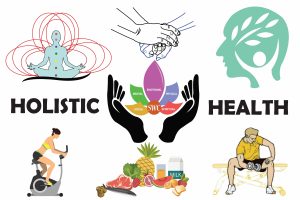The Path to Wellness: Embracing a Holistic Approach to Health

Introduction to Holistic Health
What is Holistic Approach to Health?
The holistic approach to health emphasizes the interconnectedness of the body, mind, and spirit. Rather than focusing solely on treating specific symptoms or illnesses, holistic health advocates seek to promote overall well-being by addressing multiple facets of a person’s life. This approach recognizes that physical health, emotional balance, and spiritual wellness are intertwined and that an imbalance in one area can affect the others. For example, an individual experiencing chronic stress may develop physical ailments such as headaches or digestive issues. By addressing the root causes of stress through mindfulness techniques, as well as managing physical health through exercise and nutrition, a holistic practitioner can help the individual achieve better overall health.
- The Path to Wellness: Embracing a Holistic Approach to Health
- Introduction to Holistic Health
- What is Holistic Approach to Health?
- Benefits of Embracing Holistic Wellness
- Physical Well-being and Nutrition
- Importance of Exercise for Overall Health
- The Role of Nutrition in Holistic Wellness
- Mental Health and Emotional Balance
- Strategies for Managing Stress
- Cultivating Emotional Resilience
- Spiritual Wellness and Mindfulness
- Connecting Mind, Body, and Spirit
- Practices for Spiritual Nourishment
- Holistic Healing Therapies
- Overview of Alternative Medicine
- Benefits of Holistic Therapies
- Environmental Wellness and Lifestyle
- Creating a Healthy Living Environment
- Sustainable Lifestyle Practices for Wellness
Benefits of Embracing Holistic Wellness
Embracing holistic wellness can lead to a multitude of benefits. Here are some key advantages:
- Improved Physical Health: Regular exercise and a balanced diet can enhance physical well-being, boost energy levels, and reduce the risk of chronic diseases.
- Enhanced Mental Clarity: Mindful practices, such as meditation and yoga, can improve focus, reduce anxiety, and foster emotional stability.
- Stronger Emotional Resilience: By developing coping strategies and support systems, individuals can better manage life’s challenges and stressors.
- Greater Connection to Self: Engaging in spiritual practices fosters a deeper understanding of one’s purpose and nurtures a sense of belonging in the broader universe.
In summary, the holistic approach not only aims to alleviate symptoms but seeks to cultivate a true sense of well-being at all levels of being—body, mind, and spirit. With this kind of comprehensive self-care, individuals can thrive in all aspects of their lives.
Physical Well-being and Nutrition
Importance of Exercise for Overall Health
As we navigate the path to holistic health, one cannot overlook the crucial role that exercise plays in our overall well-being. Regular physical activity is not just about achieving a certain body shape; it extends far beyond that. In fact, exercise has profound benefits for both body and mind. For instance, when Sarah decided to incorporate daily walks into her routine, she noticed remarkable changes in her mood and energy levels. Initially, it seemed daunting, but she soon found it invigorating. Here’s why exercise is vital:
- Boosts Mood: Physical activity releases endorphins, the body’s natural mood lifters, helping to combat stress and anxiety.
- Promotes Healthy Weight: Exercise helps maintain a healthy weight, balancing the calories consumed.
- Supports Heart Health: Regular activity strengthens the heart, improving circulation and reducing the risk of heart disease.
- Enhances Longevity: Studies consistently show that active individuals tend to live longer and have a better quality of life.
The Role of Nutrition in Holistic Wellness
While exercise is a fundamental pillar of physical well-being, nutrition is equally important in the holistic wellness equation. The foods we eat directly influence our physical health and emotional stability. Take the example of John, who shifted from a high-sugar diet to one rich in whole foods. With this change, he experienced increased energy and sharper mental focus. Here’s how nutrition contributes to holistic wellness:
- Fuel for Energy: Nutrient-dense foods provide the energy required for daily activities, fostering productivity.
- Supports Immune Function: A balanced diet packed with vitamins and minerals strengthens the immune system, helping to ward off illness.
- Mood Regulation: Certain foods, such as those rich in omega-3 fatty acids, can improve mood and reduce symptoms of depression and anxiety.
- Digestive Health: Fiber-rich foods support gut health, which is increasingly recognized for its connection to mental health.
In summary, both exercise and nutrition are vital components of physical well-being, working in harmony to promote a balanced, vibrant life. By embracing these aspects of holistic health, individuals can cultivate a more fulfilling and resilient lifestyle.
Mental Health and Emotional Balance
Strategies for Managing Stress
As we delve deeper into the realm of holistic health, it becomes clear that a significant aspect involves mental well-being and emotional balance. One of the most prevalent challenges people face today is stress. Learning effective strategies to manage stress is essential for maintaining mental clarity and emotional stability. Maria, for instance, struggled with balancing her work and personal life. After implementing some simple stress-management techniques, she noticed a positive shift in her overall well-being. Here are some effective strategies that can help:
- Mindfulness and Meditation: Taking a few minutes each day to practice mindfulness or meditation can enhance self-awareness and reduce feelings of anxiety.
- Deep Breathing Exercises: Deep, intentional breathing can calm the mind and body, making it easier to cope with stressors as they arise.
- Physical Activity: As mentioned earlier, exercise releases endorphins that counteract stress. A brisk walk or a quick workout can work wonders.
- Time Management: Better scheduling of tasks can prevent feelings of overwhelm. Create a to-do list prioritizing essential activities.
Cultivating Emotional Resilience
Beyond managing stress, cultivating emotional resilience is essential for navigating life’s ups and downs. Emotional resilience refers to the ability to bounce back from setbacks and face challenges with a positive mindset. Take the example of David, who learned to embrace challenges as opportunities for growth. Here are some strategies that can help build emotional resilience:
- Positive Self-Talk: Encourage yourself with affirmations and positive thoughts, especially during tough times.
- Building Support Networks: Surrounding yourself with supportive friends and family can provide comfort and strength in difficult moments.
- Flexibility: Being open to change and adapting to new circumstances can help lessen the emotional toll of unexpected challenges.
- Seeking Professional Help: Sometimes, reaching out to a mental health professional is necessary. Therapy can provide valuable tools for enhancing resilience.
In conclusion, by implementing mindful stress management strategies and fostering emotional resilience, individuals can greatly enhance their mental well-being. This holistic approach not only equips them to handle life’s stresses but also nurtures a more balanced and fulfilling life.
Spiritual Wellness and Mindfulness
Connecting Mind, Body, and Spirit
As we shift our focus towards spiritual wellness and mindfulness, we recognize that the mind, body, and spirit are inextricably linked. This connection plays a significant role in achieving a balanced, holistic life. By nurturing each component, individuals can enhance their overall sense of wellness. Consider Lisa, who discovered through her yoga practice how deeply connected her physical state was to her emotional and spiritual health. She found that when she felt grounded in her body, her mind also felt calmer and her spirit more vibrant. Here are some ways to foster this vital connection:
- Mindful Movement: Engaging in practices like yoga or tai chi not only improves physical fitness but also promotes mental clarity and spiritual awareness.
- Nature Walks: Spending time outdoors can help to ground oneself, bringing a sense of peace and connection to the larger universe.
- Meditation: Regular meditation allows for introspection and a deeper understanding of one’s thoughts, emotions, and spiritual needs.
Practices for Spiritual Nourishment
Nourishing the spirit is an essential part of holistic health. It involves engaging in practices that invigorate one’s inner self, leading to a more fulfilling life. For instance, James found that integrating specific spiritual practices into his daily routine heightened his sense of purpose. Here are some effective practices for spiritual nourishment:
- Journaling: Writing about one’s thoughts, feelings, and aspirations can reveal insights about one’s spiritual journey and foster personal growth.
- Gratitude Practice: Regularly acknowledging what one is thankful for can shift perspective and deepen appreciation for life’s experiences.
- Engaging in Community: Finding a spiritual community or group can provide support, shared learning, and a sense of belonging.
- Volunteering: Engaging in acts of kindness and service can enhance feelings of connection to others and the greater good.
In summary, connecting the mind, body, and spirit through mindful practices enriches one’s spiritual journey. By prioritizing spiritual nourishment, individuals can cultivate peace, purpose, and a deeper understanding of themselves and their place in the world.
Holistic Healing Therapies
Overview of Alternative Medicine
With a strong foundation in spiritual wellness and mindfulness, we can now explore the realm of holistic healing therapies, particularly alternative medicine. Alternative medicine encompasses a broad range of practices and treatments that focus on the whole person—mind, body, and spirit—rather than just the symptoms of a particular illness. For instance, when Emma experienced chronic back pain, she turned to acupuncture as a complementary approach. Through treatments, she not only found relief but also gained a deeper understanding of her body’s needs. Here are some common types of alternative medicine that many find beneficial:
- Acupuncture: This ancient Chinese practice involves inserting thin needles into specific points on the body to enhance energy flow and relieve pain.
- Herbal Medicine: Utilizing plant-based remedies can offer various health benefits, supporting different bodily functions and systems.
- Chiropractic Care: Focused on the musculoskeletal system, chiropractic treatments aim to restore alignment and improve overall body function.
- Naturopathy: Emphasizing natural remedies, naturopaths take a holistic approach, combining nutrition, herbal medicine, and lifestyle changes.
Benefits of Holistic Therapies
The benefits of engaging in holistic therapies extend beyond symptom relief. Many individuals experience profound positive changes in overall well-being. Consider Mark, who sought a holistic approach to manage his anxiety. Through a combination of meditation, herbal supplements, and regular counseling, he reported feeling more centered and less overwhelmed. Some key benefits of holistic therapies include:
- Personalized Care: Holistic practitioners focus on individuals’ unique needs, tailoring treatments to support specific health goals.
- Enhanced Well-being: Many report improvements in emotional balance, mental clarity, and physical health, leading to a more profound sense of well-being.
- Preventative Approach: Holistic therapies often emphasize prevention, promoting healthy lifestyles and self-care practices to avert illness.
- Empowerment: These therapies encourage individuals to take an active role in their health journey, fostering a sense of ownership and agency.
In summary, exploring holistic healing therapies offers individuals diverse tools for enhancing their well-being. By integrating alternative medicine, one can experience a more comprehensive approach to health that addresses the interconnectedness of the mind, body, and spirit.
Environmental Wellness and Lifestyle
Creating a Healthy Living Environment
As we transition into the realm of environmental wellness and lifestyle, it’s clear that the spaces we inhabit greatly affect our overall health. Creating a healthy living environment is essential for nurturing physical and mental well-being. For instance, when Jenna decided to declutter her home, she not only felt a sense of relief but also found that her productivity increased. Here are some practical steps for cultivating a healthier environment:
- Declutter Regularly: A clean and organized space reduces stress and fosters clarity. Take the time to evaluate belongings and let go of items that no longer serve you.
- Incorporate Nature: Bringing plants into your home can improve air quality and create a calming atmosphere. Consider adding low-maintenance plants like snake plants or pothos for easy greenery.
- Optimize Natural Light: Maximize sunlight by opening curtains during the day. Natural light boosts mood and supports a healthy circadian rhythm.
- Choose Non-Toxic Products: When cleaning or decorating, opt for non-toxic and eco-friendly products to minimize exposure to harmful chemicals.
Sustainable Lifestyle Practices for Wellness
In addition to creating a healthy living environment, adopting sustainable lifestyle practices can significantly contribute to overall wellness. A sustainable approach helps not just personal health but also the health of the planet. For example, when Tom started biking to work, he felt more energetic and contributed to reducing carbon emissions. Here are some sustainable practices that promote wellness:
- Eat Local and Seasonal: Supporting local farmers and eating seasonal produce enhances nutrition and reduces environmental footprints.
- Reduce Waste: Implementing a recycling and composting system at home can significantly decrease waste output and promote sustainability.
- Practice Mindful Consumption: Before making purchases, consider the necessity and environmental impact of items to cultivate a mindset of intentional living.
- Water Conservation: Simple actions, like fixing leaks and using water-efficient fixtures, can save water and reduce bills.
In conclusion, fostering environmental wellness involves creating healthy living spaces and adopting sustainable practices for everyday life. By taking these steps, individuals not only enhance their personal well-being but also contribute positively to the planet, creating a ripple effect that benefits all.





